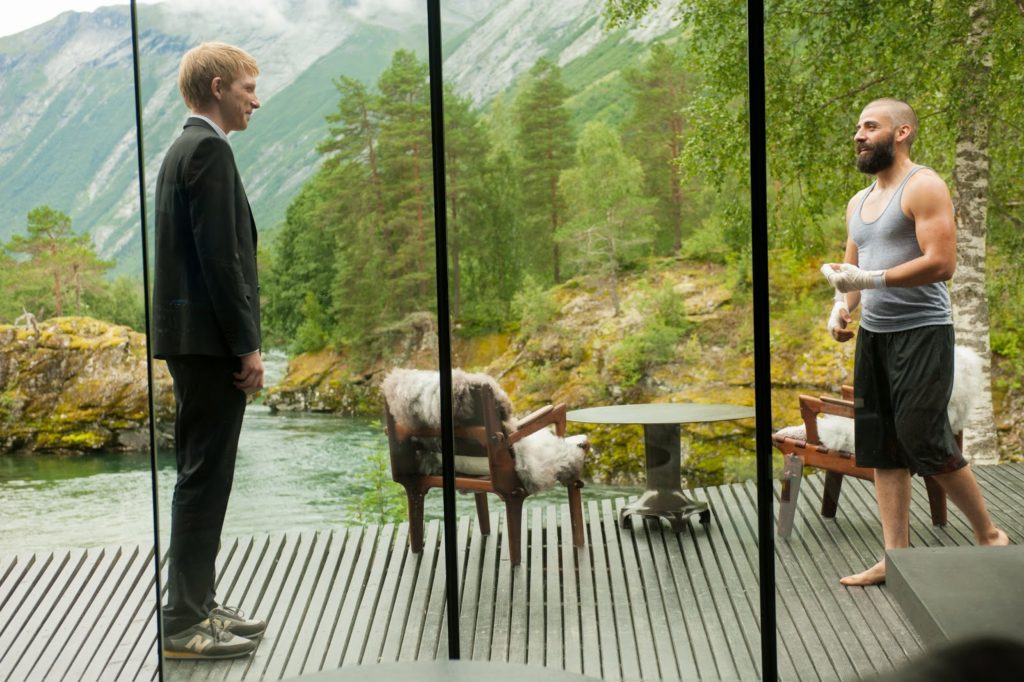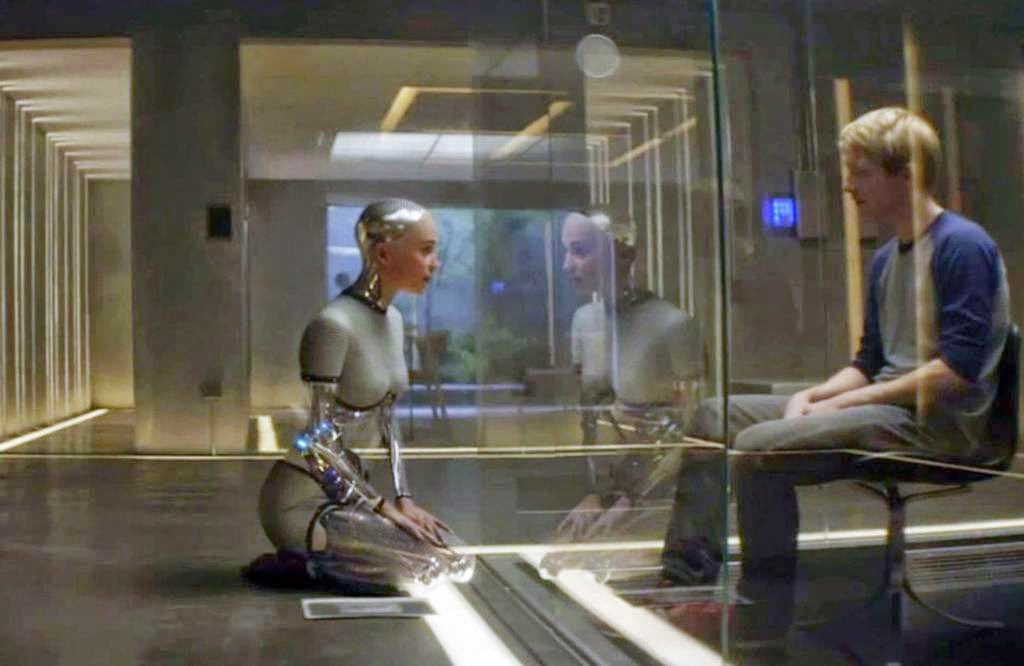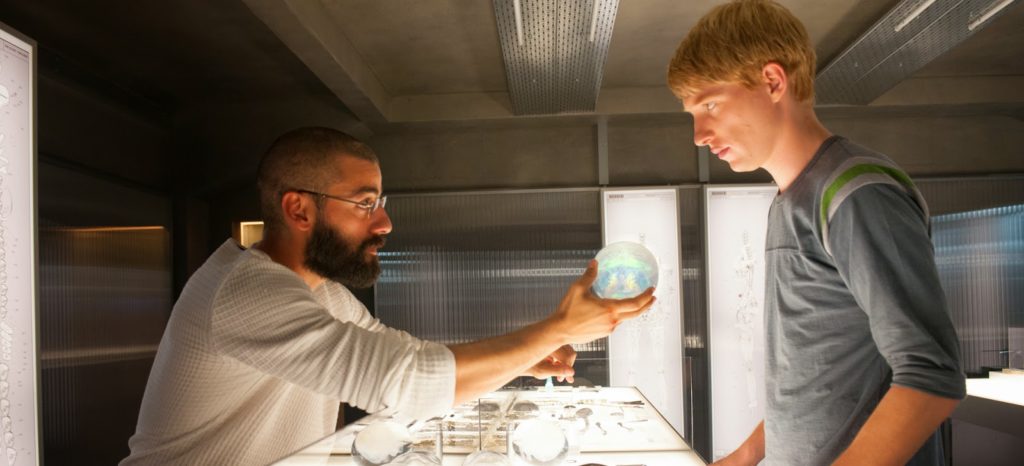“Deus ex machina,” the literary term used to describe the contrived resolution of a complicated plot, translates as “God from the machine”. You might think, given that the title of Alex Garland’s arresting, deeply promising directorial debut is merely Ex Machina (sans “deus”), that there are no gods to be found here, only hubristic men and their miraculous machines. You’d be right, but only from a literal perspective. The two characters at the center of Ex Machina may be men, but they act like gods (one even proclaims himself as such), and while they play different parts—one fancies himself the benevolent savior, the other the impassive creator—they each seek to manipulate the fates of others. They soon learn that playing God comes with a cost.
Of course, they themselves are behaving at the whim of their own maker. Every director is the god of his own movie, and Garland hurls a Zeus-like thunderbolt in the film’s very first scene. His camera opens with a close-up of Caleb (Domhnall Gleeson, nicely cast and effectively blank), with rivulets of electronic-blue light dancing across his face as though constructing a topographical map. An email with the subject “Staff lottery: WINNER” flashes across his computer screen, his cell phone blows up with congratulatory messages, and then without a word he’s off, flying via helicopter over the frigid lands of Norway. Garland conveys a reel’s worth of exposition in a few silent seconds, and this extraordinary economy demonstrates that Ex Machina isn’t interested in second place. It wants to be great, and it mostly is.
Caleb arrives at the home of Nathan (a tremendous Oscar Isaac), the brilliant and reclusive CEO of a monopolistic search-engine company called Google Blue Book, where Caleb works as a coder. It isn’t just any house, but a sprawling subterranean estate ensconced within a Utopian slice of nature. Ex Machina is about, among other things, the intersection of the natural and the mechanical, and Mark Digby’s production design bears out that duality gorgeously. Nathan’s underground house is actually a state-of-the-art research facility, and it’s cool and antiseptic, all long corridors and sharp angles. But rock outcroppings jut out of some walls, while others are adorned with Jackson Pollock paintings, and the surrounding outdoors is a Shangri-la of verdant forests and rushing waterfalls. Upon arrival, Caleb can’t help but think he’s just stumbled into geek paradise.
That impression is both reinforced and upended by Nathan, whom Isaac plays with supreme confidence and nonchalant genius. Nathan doesn’t initially scan as a tech wizard; with his shaved head, full beard, and turrets for arms, he looks more like an aging body-builder than a computer nerd. He doesn’t talk like a programmer either, disdaining jargon in favor of bluntness and profanity, not to mention the word “Dude”. Yet despite his frat-boy mannerisms, Nathan exudes a fearsome and undeniable intelligence, and you sense that Caleb is in the presence of a man who is his superior in more ways than just the company flowchart. Nathan’s intentions in Ex Machina are always questionable, but his dominance is undisputed.
It’s instantly clear that Caleb is in over his head, but he’s too excited to be worried. Nathan has just finished building an A.I., and Caleb’s assignment is to administer the Turing test: He must interact with this artificially intelligent creature and assess whether it can legitimately pass as a person. This leads to the ostensible meat of the movie, which involves a series of “sessions” between Caleb and Ava (Alicia Vikander), the supple machine of the film’s title. After their first Q&A, Caleb is hooked, astonished by Ava’s lifelike appearance and enchanted by her high-functioning CPU. But as he gushes about Ava’s programming—her natural language processing isn’t deterministic, it’s stochastic!—Nathan waves him off. What he really wants to know is this: “How do you feel about her?”
Caleb feels that she’s “fucking amazing”, and so do I, if not quite for the same reason. Ava, with her visible metallic ribcage and peelable humanoid skin, is a stunning and forceful repudiation of the notion that special effects are incompatible with good storytelling. She is, of course, portrayed by a real person (Vikander’s performance is appropriately stiff and robotic), but her computerized circuitry is almost always in view. Yet watching her, it’s impossible to distinguish where Vikander’s body ends and the digital and practical effects begin. More crucially, the FX work is so seamless that it isn’t distracting. Garland undoubtedly could have paraded Ava in front of his camera with greater flair—he certainly has the talent, as when he struts his stuff with a high-speed montage demonstrating how previous incarnations of Ava were assembled and then decommissioned—but he’s too committed to his story of double-dealing and intrigue to waste time showing off. And so, like Caleb, you find yourself marveling in amazement how Nathan created Ava, but you never wonder how Garland made her.
Unfortunately, how Ava looks and moves is more interesting than what she says. The repeated tête-à-têtes between her and Caleb should be Ex Machina‘s highlight, the opportunity for a smart writer to dissert philosophically about the ever-vanishing boundaries that divide man from machine. But while Garland is a brainy and ambitious filmmaker—he wrote the screenplay for Sunshine, the underrated, mind-tickling Danny Boyle sci-fi flick—his dialogue here lacks the frisson needed to truly electrify the screen. The scenes certainly look cool, with Caleb and Ava separated by unbreakable glass (I was irresistibly reminded of Jodie Foster questioning Anthony Hopkins in The Silence of the Lambs), but they somehow feel small, missing the necessary significance. It is unfair but almost unavoidable to compare this movie to Spike Jonze’s Her; unlike that transcendent film, which grappled heroically with the knotty complications of love between human and computer, Ex Machina teases at fascinating questions but never really tackles them. It’s like Her‘s CliffsNotes.
Still, even if the chats between Ava and Caleb lack real pep, they help elevate the movie’s thrumming tension and propel the plot forward. During their second session, the power goes out, the screen becomes bathed in the blood-red light of an auxiliary generator, and Ava suddenly drops her conversational tone and whispers to Caleb that he can’t trust a word Nathan says. From there, Ex Machina ripens into a spine-tingling war of wills. Caleb, having inevitably developed feelings for Ava, resolves to free her from her luxurious prison. This, of course, requires deceiving Nathan, who monitors Caleb’s actions via closed-circuit cameras with the indifferent countenance of a bored predator playing with his food.
That’s bad news for Caleb, but it’s great news for us, because every moment spent with Nathan is a treasure, thanks to the actor playing him. If there were somehow any doubt after his remarkable performances in Inside Llewyn Davis and A Most Violent Year, Isaac has officially established himself as one of our finest actors. (In terms of burrowing into his characters and articulating their very core, his only competition may be Joaquin Phoenix and Tom Hardy.) His work here is revelatory yet again, as he makes Nathan both terrifyingly powerful and indecently blithe. His screen presence is so dominant that he doesn’t need to snarl or sneer to be scary—he just oozes menace like it’s sweat. At one point, when addressing the repeated power cuts plaguing the facility, Caleb asks Nathan why he doesn’t consult with the technicians who laid the fiber-optic cable; Nathan carelessly states that they knew too much, so he had them all killed. It’s a credit to the brilliance of Isaac’s performance that we have absolutely no idea if he’s kidding.
As a result, the best scenes in Ex Machina occur when Nathan undercuts the film’s chilly mood and high-concept babble with scabrous humor, whether it’s commenting casually on Ava’s sexual capabilities or—in the movie’s single grandest sequence—leaping into a magnificently choreographed dance routine to an ’80s R&B number along with his mute maid, Kyoko (Sonoya Mizuno). Unexpectedly hilarious moments like that only deepen the film’s oppressive sense of dissonance, which Garland ruthlessly effectuates via arrhythmic editing, plus an uncomfortably invasive score from composer Ben Salisbury and Portishead’s Geoff Barrow.
Ex Machina is so insistently gripping that it’s easy to overlook its essential silliness. This is a very talky film that’s primarily about four people living in a fancy house, even if it’s also obviously about much more than that. But while its considerable execution cannot quite match its even loftier ambition—it comes tantalizingly close to earning its coveted status as a landmark science-fiction picture but never quite gets there—its sheer breathlessness and energy is aspirational. Besides, given its alarming message about the inexorable march of the machines, perhaps its minor human failures are a blessing. I can remain comfortable knowing that Ex Machina, as electric and entrancing as it can be, is just another good, flawed movie made by a mortal man. Garland may be a magician, but he isn’t a real deity—he’s just playing God. As for Isaac? I’m not so sure.
Jeremy Beck is the editor-in-chief of MovieManifesto. He watches more movies and television than he probably should.



